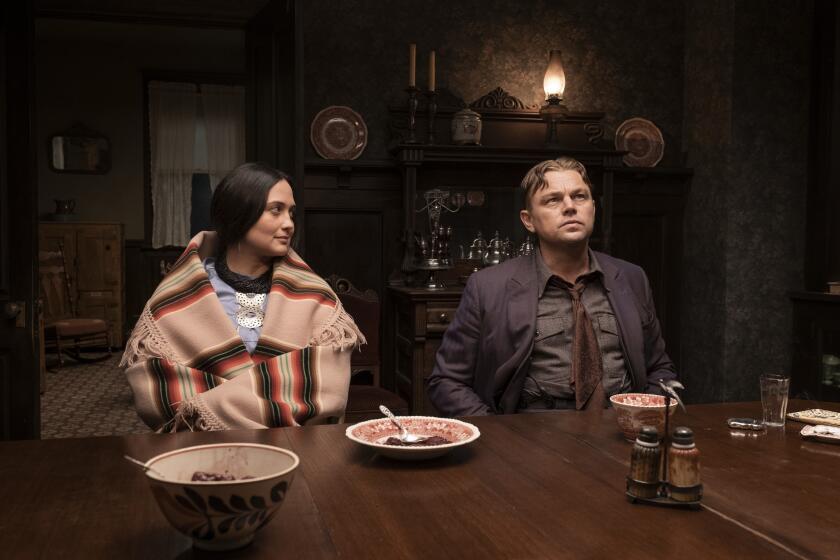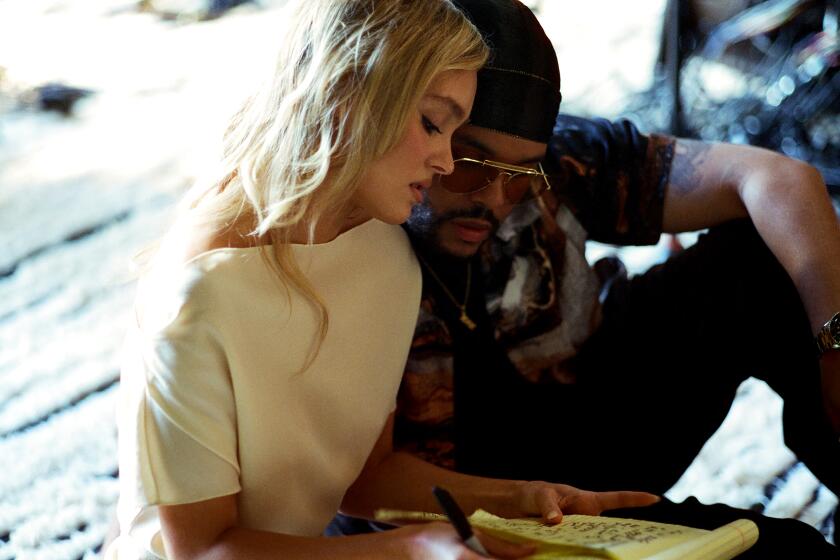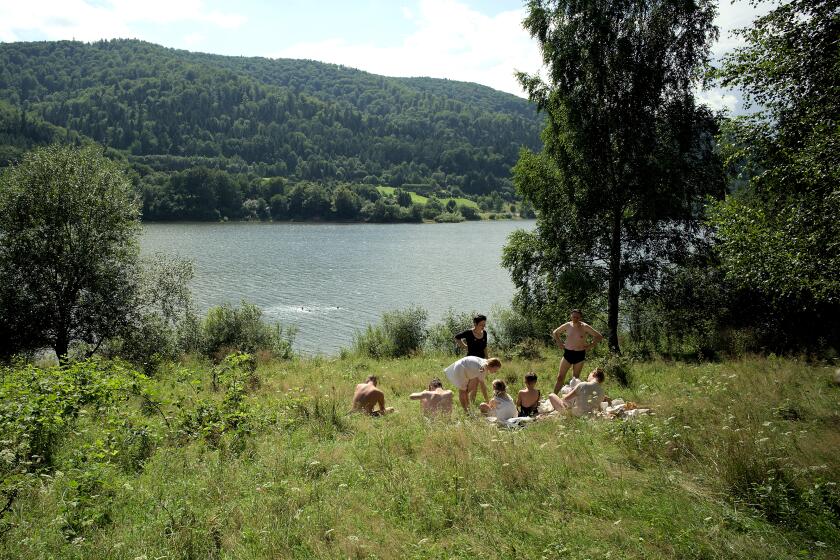Our critics pick their highlights and lowlights from the Cannes Film Festival
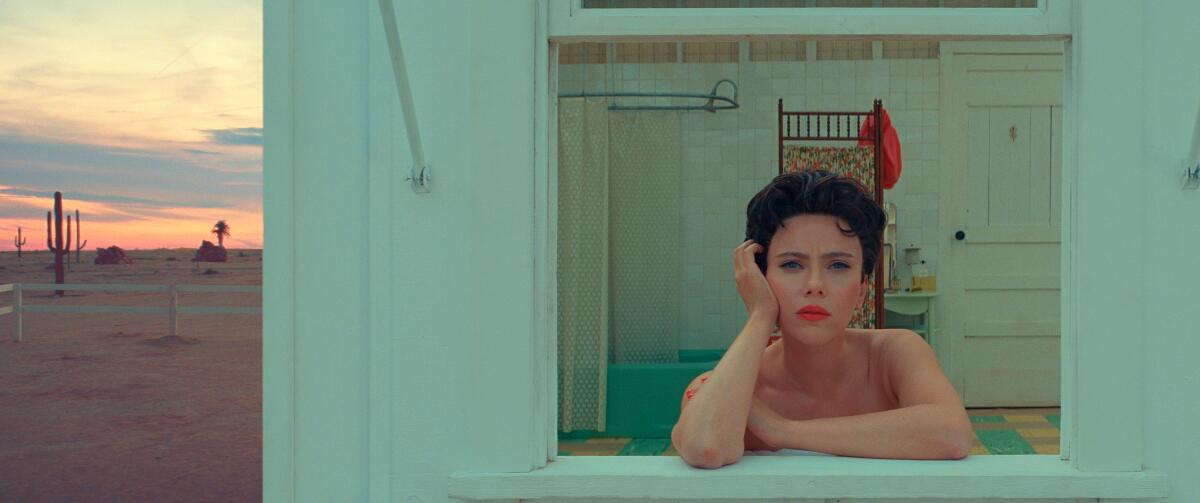
- Share via
CANNES, France — As the 76th Cannes Film Festival draws to a close, Times film critic Justin Chang and culture critic Mary McNamara got together to discuss their highlights (and lowlights) from this year’s event.
Justin Chang: We’re more than halfway through the Cannes Film Festival, and by this point, as usual, a certain tension has set in: I’m torn between the desire to go home at once — to see my family, to sleep in my own bed, or just to sleep, period — and the desire to stick around, to squeeze in as many movies as I can and make sure I don’t miss that hot under-the-radar title people are buzzing about (like “The Delinquents,” a critical favorite in the festival’s Un Certain Regard section).
This appetite for catch-up and discovery usually kicks in once we’re over the hump, and this year’s festival was humpier than most, what with those two hyped-up Hollywood behemoths, “Indiana Jones and the Dial of Destiny” and “Killers of the Flower Moon,” plus similarly buzzy titles like Wes Anderson’s “Asteroid City” and the first two episodes of HBO’s scandal-ridden series “The Idol.”
The searing, sprawling ‘Killers,’ which premiered Saturday at Cannes, is both like and unlike anything its director has ever done.
You went to see “The Idol,” Mary, and from your less-than-rhapsodic dispatch, it sounds like I didn’t miss much. In a similar spirit, I’ll offer a few words of my own on “Asteroid City,” which is playing in the main competition, and which finds Anderson once again bringing a densely imagined world to something almost resembling life. This one takes place in 1955 in a fictional desert town, the site of an ancient meteorite crater, an annual convention for junior astronomers and, as you might guess, a few close encounters of the whimsical kind.
Really, though, it’s the latest destination for one of Anderson’s characteristically overstuffed all-star ensembles, featuring Scarlett Johansson, Jason Schwartzman, Tom Hanks, Tilda Swinton, Bryan Cranston, Adrien Brody, Edward Norton, Liev Schreiber, Hope Davis, Steve Carell, Jeffrey Wright, Matt Dillon, Willem Dafoe, Margot Robbie and … have you got all that? Do you even care? Anderson doesn’t seem to, given how little he gives his actors to do (with Schwartzman’s poignant performance being the prominent exception).
I found myself checking out of “Asteroid City” fairly early, despite its considerable widescreen beauty; the American Southwest has rarely looked more dustily bespoke, and Anderson’s gift for world building — evident in the way his camera roves across the playful minutiae of Adam Stockhausen’s production design — is a genuine delight. The writer-director’s wall-of-verbiage approach, however, is wearying in the extreme, as he brings in his usual panoply of precocious kids, stunted adults, aspect-ratio-shifting framing devices, etc. It’s an awful lot of movie, but barely 24 hours after seeing it, I can’t say I remember much about it.
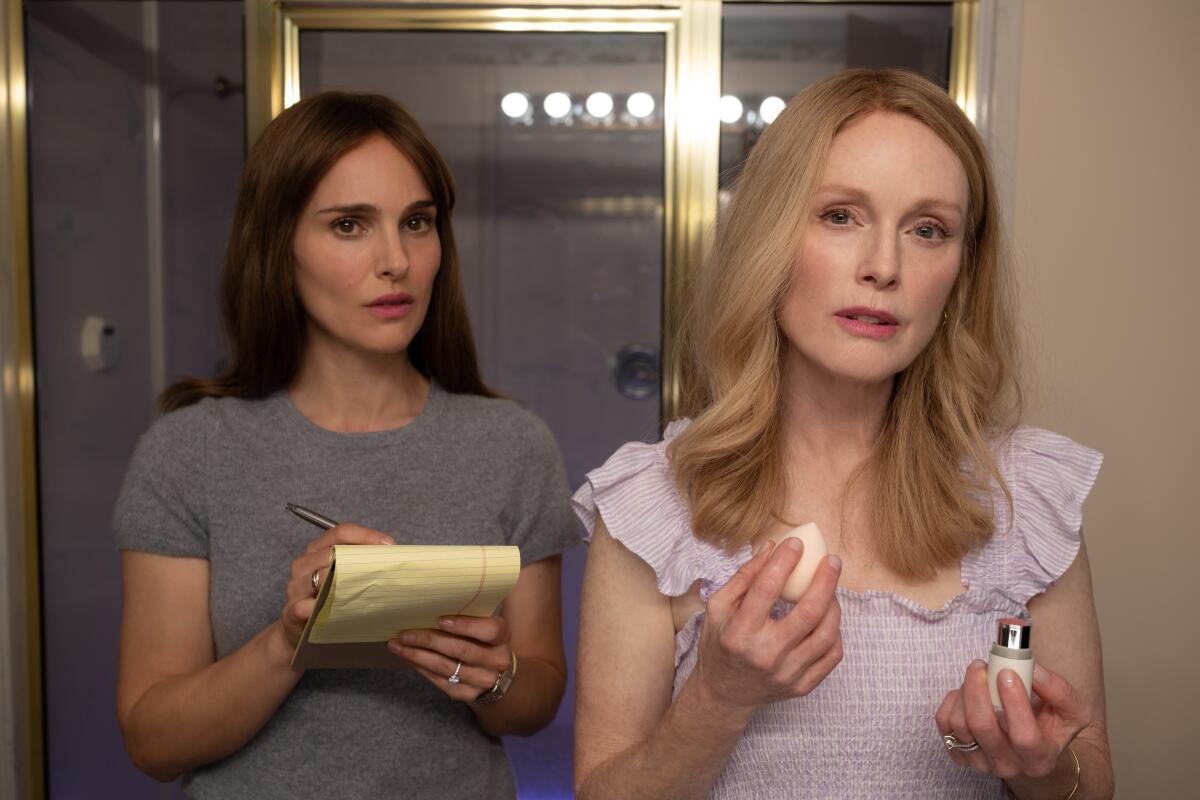
Mary McNamara: Well, I saw it a few hours after you and though I remember many of the things that happened, including a truly amusing appearance by Jeff Goldblum, I couldn’t tell you why much of it happened or what it all meant. And as for the desert town, I kept thinking I had somehow wandered into California Adventure’s Cars Land. (If only there had been an Owen Wilson cameo!)
The audience was surprisingly restless: lots of rustling and murmuring throughout, which was pretty shocking given the utter silence and eerie stillness of most screenings, and around the halfway mark, more than a dozen people left.
I’m looking forward to your thoughts on “The Delinquents,” which I liked, and as I’m leaving a few days before the festival’s end, I’m sad that I’m going to miss Alice Rohrwacher’s “La Chimera” — I will rely on your report.
As you say, it’s been a big year, Hollywood-wise. Todd Haynes also debuted his disturbing yet comedic “May December” (which was just snapped up by Netflix), but I’ve also seen so many fine international films that I’ve begun to lose track: “Homecoming” (“Le Retour”), which premiered early in the festival, remains a favorite, as does “The Zone of Interest,” which you wrote about so movingly, along with “Monster,” the Katherine Parr-empowering “Firebrand” and “Anatomy of a Fall” (“Anatomie d’une Chute”).
A naked attempt to lower the median age of the Cannes Film Festival, ‘The Idol’ is not as shocking as it thinks it is.
I am even less of a fan of “Killers of the Flower Moon” than you are, but fortunately it is only one of several films that deal with the oppression and/or extermination of Indigenous peoples. The Un Certain Regard program showed “The New Boy,” which stars Cate Blanchett as a nun facing off against an extraordinary Aboriginal youth, and “The Settlers” (“Los Colonos”) depicts the brutal slaughter of Chile’s indigenous Selk’nam people.
It’s a lot. And even as early ticketing glitches appear to have been ironed out — no more waiting for hours in the rain only to be turned away from the Debussy, one of the bigger screening rooms here — the late nights and early mornings are beginning to take their toll. The problem with Cannes is that there are just so many movies, and though you have near superhuman stamina — fueled, no doubt, by your beloved poulet rôti-flavored potato chips — I am entering a state of cinematic overload.
Also, I have really got to stop eating gelato. But how can I when there are like five gelato joints between our place and the Palais des Festivals? C’est impossible! I will simply have to leave the country.
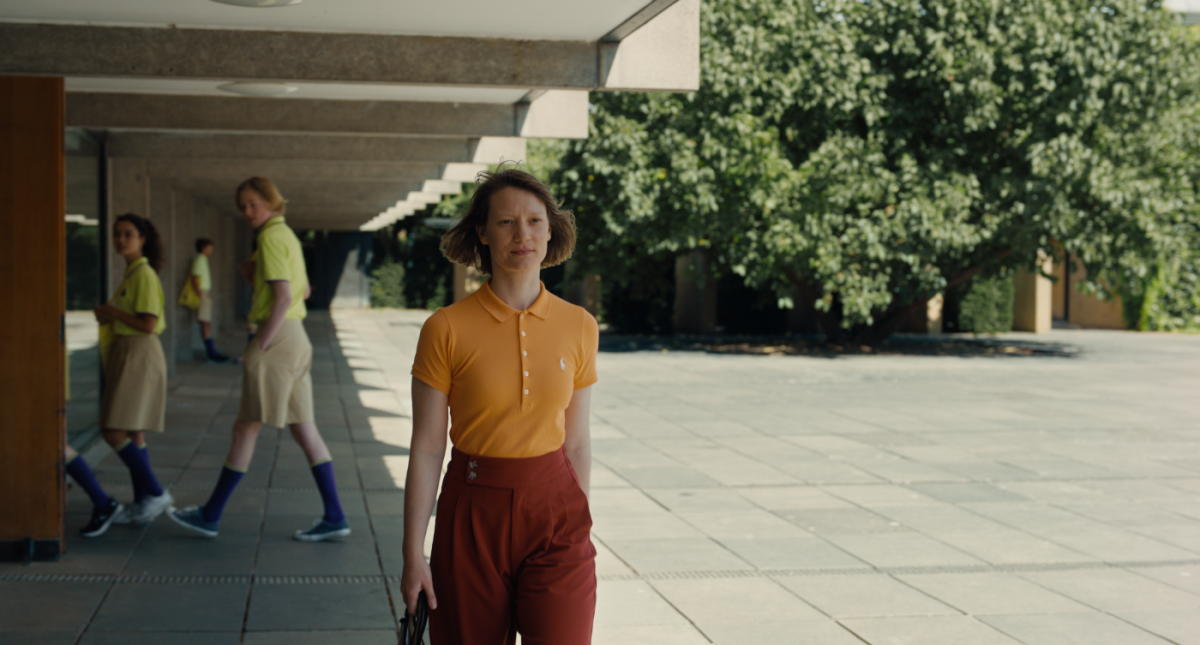
Chang: My poulet rôti potato chip consumption has surprised even me, Mary, though I’ve rationalized it away as best I can. I mean, surely all those walks up and down the Croisette, all those steps up and down the Palais stairs and all that endless queuing outside screening rooms must be offsetting my caloric intake to some degree.
As a general rule, film festivals don’t breed great eating habits. Perhaps I should be more like the impressionable young boarding-school students in Jessica Hausner’s poorly received competition entry “Club Zero,” who, at the instruction of an eerily charismatic new teacher (Mia Wasikowska), begin practicing the art of conscious eating — taking slow, small bites of their food, reducing their meat consumption and, finally, eliminating food altogether. The movie is (sort of) a satire, though what its targets are — malevolent teachers, naive young people, environmental activism, cultish groupthink — remains very much up for debate. I didn’t hate it, though to hear from chatter along the Croisette, many, many people did.
The British-born filmmakers Jonathan Glazer (‘The Zone of Interest’) and Steve McQueen (‘Occupied City’) have made two of this year’s essential Cannes Film Festival titles.
By contrast, most of Cannes seemed to swoon for “Fallen Leaves,” the latest melancholic charmer from beloved Finnish writer-director Aki Kaurismäki (a Cannes fixture with past movies like “The Man Without a Past” and “Le Havre”). No less than Wes Anderson, Kaurismäki sticks dependably to a distinctive, unmistakable style — one predicated on exquisite craftsmanship, deadpan humor and stealth emotion. Also, “Fallen Leaves” runs 81 minutes, and who doesn’t love that? You could watch it at least twice in the time it would take you to get through some of the competition’s running-time heavyweights, like “About Dry Grasses,” a typically talky, absorbing 197-minute drama from Turkish auteur Nuri Bilge Ceylan, and “Youth (Spring),” Wang Bing’s excellent 218-minute immersion in the busy social lives and stultifying routines of several young Chinese textile workers.
Much has been made of the unusual number of three-hour-plus movies this year, across all sections of the festival. It isn’t easy making time for longer movies, though I’m personally glad I did in the case of the leisurely paced “Close Your Eyes” (“Cerrar Los Ojos”), the first feature in decades from the Spanish master Victor Erice (“The Spirit of the Beehive”). I have to admit I was exhausted when the movie began, especially since Erice takes his time unfurling his story about a thwarted film director, a missing actor and the way art can both bring people together and tear them apart. It’s a deeply moving tale of cinema, about memory and friendship and loss, with a democratic spirit worthy of the great Howard Hawks, who’s nicely referenced here in one of the most blissful scenes I’ve seen all year.
My first thought after exiting the theater: That was great! My next thought: Why wasn’t it in competition?
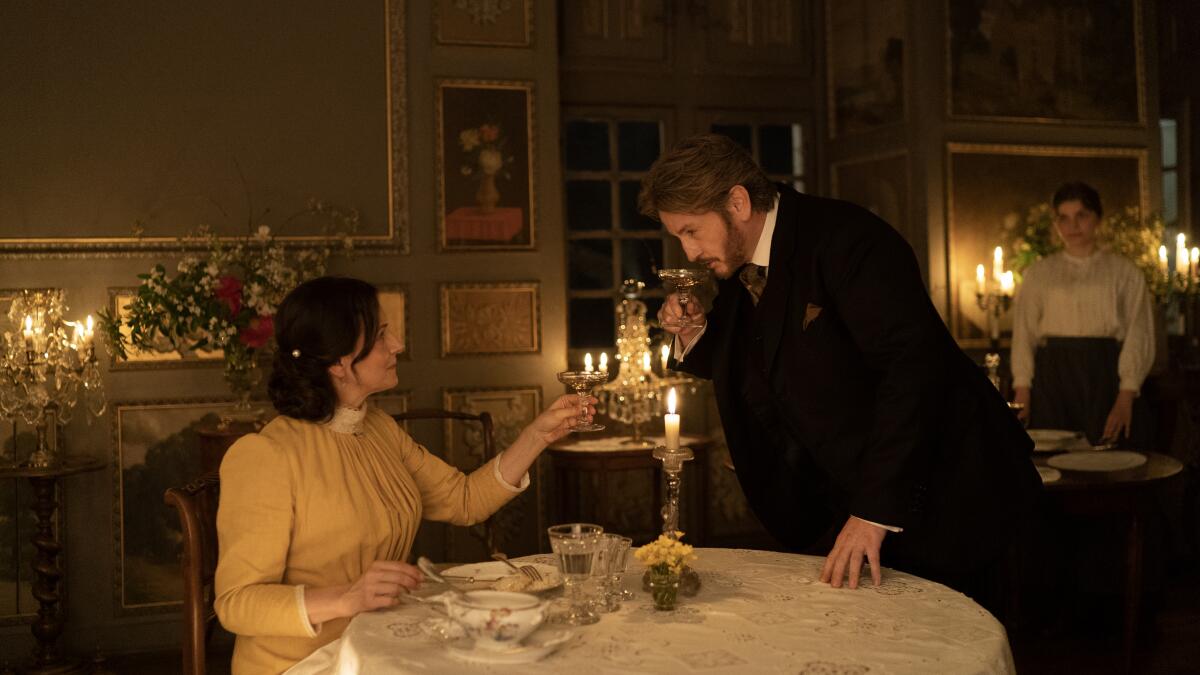
McNamara: Except there are so many great films in competition! It was worth seeing Nanni Moretti’s mostly delightful “A Brighter Tomorrow” (“Il Sol Dell’Avvenire”) just for the shade it throws at Netflix. Moretti also stars as a director facing personal and artistic difficulties as he struggles to finish a film; like “Asteroid City,” it is, in part, about the creative process (and shares some remarkably similar soundstage looks).
But since we began this conversation, we saw Tran Anh Hung’s “The Pot-au-Feu” (“La Passion de Dodin Bouffant”) and it is definitely the one I will be recommending to my friends when it makes it to the States. Starring Benoît Magimel as Dodin, a famous chef, and Juliette Binoche as Eugenie, his longtime cook, it is a slow and seductive contemplation of food as the language of love. (I finally understand why French kitchens have so many exquisite pots and pans.) Rich with detail and subtext, this gorgeously shot film spends almost all its time capturing the creation and consumption of dishes as complicated and satisfying as the love that Dodin and Eugenie share.
Yes, there have been a lot of (perhaps over-)long films this year, but I wanted this one to extend even beyond its 2½ hours. Not since “Babette’s Feast” has cooking cracked my heart open this wide.
Though I definitely left the theater hungry, and in a much more healthy way than after “Club Zero,” which I did not love. Still, the fact that those two films are in competition here is heartening — yes, there are certain topical trends, but the voices and eyes of each director and screenwriter are wildly disparate.
Speaking of writers, I am surprised that, given the number of American filmmakers and performers here, there hasn’t been more mention of the writers’ strike. I understand that Cannes holds itself separate from the vagaries of the world, but that felt a bit strange, no?
In an effort to increase the pressure on studios to come to an agreement with the Writers Guild of America, some showrunners have chosen to stop publicity work for their series.
Chang: A bit, yes. Apart from a few expressions of support for the writers from this year’s competition jurors, including president Ruben Östlund and Paul Dano, I haven’t heard too much chatter about the strike emanating from, say, the press conferences for the American films playing here at the festival. That said, as the Hollywood trades have been reporting, the strike has cast a quiet pall over deal-making activity in the Marché du Film, the enormous film market that operates alongside the festival. Some of the big American titles attracting bids at the moment have delayed or shut down production, causing a potential pipeline problem that would only worsen if the strike were to drag on — or, as some are expecting, if other guilds were to join in.
Cannes isn’t Hollywood, thank goodness; the odd blockbuster notwithstanding, some of us come here every year because it offers such a refreshing corrective to the Americentric attitudes toward cinema we deal with day in and day out. At the same time, Cannes and Hollywood have always had a delicate, symbiotic relationship, and the festival does reflect financial and labor struggles in the larger global industry sooner or later. (I remember Cannes 2010 being a particularly weak edition, which many at the time attributed to the delayed industry effects of the 2008 financial crisis.)
In any event, Mary, merci beaucoup for a wonderful festival, and I’m personally grateful that one of the last movies we saw together was indeed “The Pot-au-Feu,” a sublimely sensual gastronomy lesson that might have been the most purely pleasurable film in competition. It’s also not a bad movie about the artistic process, about the combination of skill, technique, experience and instinct required to take a bunch of disparate ingredients and bring them together into a successful whole. A good movie achieves much the same alchemy, and so does a good festival.
More to Read
Only good movies
Get the Indie Focus newsletter, Mark Olsen's weekly guide to the world of cinema.
You may occasionally receive promotional content from the Los Angeles Times.
